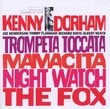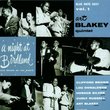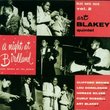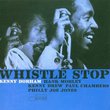| All Artists: Kenny Dorham Title: Round About Midnight At The Cafe Bohemia: Complete Members Wishing: 4 Total Copies: 0 Label: Blue Note Records Release Date: 1/29/2002 Album Type: Original recording reissued, Original recording remastered Genres: Jazz, Pop, Broadway & Vocalists Styles: Cool Jazz, Bebop, Traditional Vocal Pop Number of Discs: 2 SwapaCD Credits: 2 UPC: 724353377526 |
Search - Kenny Dorham :: Round About Midnight At The Cafe Bohemia: Complete
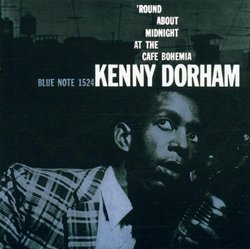 | Kenny Dorham Round About Midnight At The Cafe Bohemia: Complete Genres: Jazz, Pop, Broadway & Vocalists
24 Bit Digitally Remastered Compilation from the Rvg Label. |
Larger Image |
CD DetailsSynopsis
Album Details 24 Bit Digitally Remastered Compilation from the Rvg Label. Similar CDs
|
CD ReviewsThe uncrowned king G. Schramke | Vienna, Austria | 03/19/2002 (5 out of 5 stars) "Kenny Dorham was such a great trumpet player, but even considering the fact, that his recording period spanned about 20 years, starting with important contributions in the forties, when he played with Charlie Parker, Bud Powell and others, it quite seems, that he largely was taken for granted by the wider audience, which paid most of the attention to more glamorous players, namely Dizzy and Miles. But listening to Kenny Dorham's Blue Note recordings you will notice, that he had it all: A beautiful, slightly bittersweet sound, really nice, long lines and a great knowledge about chord-progressions. Of course, he also was a great composer. This latest reissue from the RVG-Series offers for the first time the possibility to really listen to all recorded material from that live-date. You will love it, especially if you already own the two Art Blakey CDs "Life at Café Bohemia", which also feature Dorham at his best. About the personnel of this date, I'd like to notice the presence of Kenny Burrell on some of the tunes. He had finished his first own album ("Introducing Kenny Burrell") just the day before and he sure was in a playing mood. the choice of J.R. Montrose is also a very interesting one. this relatively obscure tenorist really has nice ideas and a pleasant, light sound, somehow similar to Stan Getz or Zoot Sims and he really takes care of business. Bobby Timmons on piano already had his block-chord style, which later would become famous when he was part of Blakey's Jazz Messengers. Sam Jones on bass and the to me completely unknown Athur Edgehill on drums contribute everything necessary for a good groove, so let's say, that I really enjoy this music: The tremendous swinging versions of "K.D.'s Blues", "Night in Tunisia", "Who Cares", a very relaxed "My Heart Stood Still" and gorgous ballad interpretations of "Autumn in N.Y." and "Round Midnight". Considering the originals, I think, that "Monaco" is the most interesting one. It's based on an idea, which first appeared on another Dorham original ("Minor's Holiday") from the above mentioned Art Blakey date and Dorham's first Blue-Note Album, the fantastic "Afro Cuban", which I also reviewed. Enjoy it!" Sophisticated and supple hard bop from the summit Samuel Chell | Kenosha,, WI United States | 07/22/2006 (5 out of 5 stars) "Kenny Dorham was a musician's musician, the thinking person's trumpet player (though the emotions are personal and deep, even if not instantaneous or obvious). His tone is light but round and always centered, capable of sounding vulnerable and breathy one instant and dynamically brilliant and virtuosic the next. Since Kenny is the least "showy" of trumpet players, my hunch is that this Dorham-led date will not impress the uniniated overly much and that it should probably be purchased after one of his later studio sessions or his dates with Art Blakey ("Live at the Cafe Bohemia") or Horace Silver ("The Jazz Messengers"). Once you've acquired a taste for the Dorham sound--which, incidentally, can be addictive--the pleasures of the present session will be all the more apparent. Each of the tunes not only features first-rate (if understated) solo work but attention to compositional details that were frequently missing in "hard bop" performances of the era. Listen to the title song--with all of Monk's transitions and intertextual motifs intact--or to "Night in Tunisia," which may be less dramatic and forceful than the version with Clifford Brown and Art Blakey at Birdland but is ten times more musical. The underrecorded, melodically lithe J. R. Monterose complements K. D. in the frontline as effectively as Hank Mobley, and the overrecorded Kenny Burrell has never sounded more inspired and assured, almost overmatching the more subdued approach of the other players. Bobby Timmons restricts his solo time along with the block chord cliches, turning in some of his most tasteful work on record. While this may not be "the" Kenny Dorham recording, it belongs in the top 5--which, speaking of the pantheon of all-time trumpet greats, is probably the short list on which Kenny himself deserves mention." Sharp Sword under Smooth Water Todd M. Stellhorn | baltimore, MD | 08/13/2007 (5 out of 5 stars) "As much as I like Dorham's collaborations with Joe Henderson (una mas, in'n out, trumpet tocatta, page one) and Hank Mobley (whistle stop, afro-cuban) you really have to tip your porkpie hat to Dorham's own working group, as documented on this album. Here is one of the most interesting lineups in all of the blue note catalog, it's a mix that challenges itself, yet is cohesive in a smoothly angular way (think of a sharp sword submerged under running water), and above all interesting. Some players seem to come out of nowhere and just blow your mind with the uniquness of their playing; J.R. Monterose is on of these (do yourself a big favor and check out his "The Message", or the self titled blue note offering that is only available as a japanese pressing unfortunately) he had a Rollin's like sound but his phrasing was absolutely his own, and to me something of a revelation. Monterose can come from behind the beat, snort out choppy phrases, or blow with a constrained and lyrical intensity, but whatever he's doing it is absolutely his own sound. Besides Monterose we have a young blocking Bobby Timmons, who in his pre-fame at this point is a bit more restrained but nevertheless perfect for the group sound. Throw in the Adderley inclined Sam Jones, Kenny Burrell for a few songs, and a drummer I can't recall ever hearing of, and you have a very eclectic line up, and then of course there's Kenny Dorham himself. The words: "Kenny Dorham" are usually followed by the words "underrated", and "Miles Davis". The first was sadly his lot in the jazz life, one he shared with many other fine players, and the later I suppose is because Dorham doesn't belong to the Clifford Brown red hot blowing school of trumpet, and when the casual jazz fan thinks of lyrical cool blowing on trumpet the words Miles Davis pop up. However this, like all analogies is a bit weak. Dorham was a comtemporary of Davis and while they share some similarities, they have just as many differences. For one thing Dorham was much more of a composer than Davis, and while they are both lyrical, and while lyrical might define Davis, the strenght of Dorham's playing is in the logic of his solos, you pay attention to where he's going, not just to the sound. And probably since he is a composer, his sound is much more involved in the group interplay than Davis normally was. None of this is to take anything away from Miles, rather when it comes to non-Clifford inspired trumpet players there ought to be room made for Kenny Dorham. In closing what we have in this album is a documentation of an extremly interesting and diverse group who will show you a musical structure of many layers if you have the inclination to listen. Most of all enjoy.
" |

 Track Listings (9) - Disc #1
Track Listings (9) - Disc #1